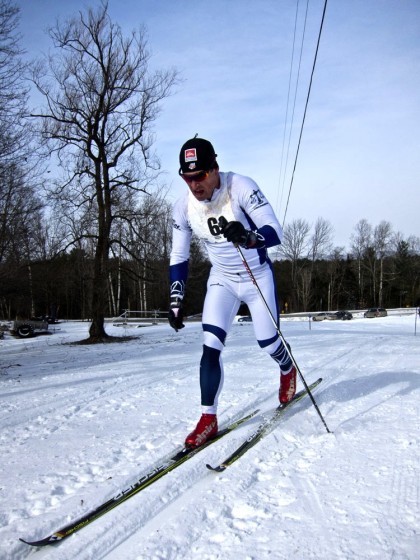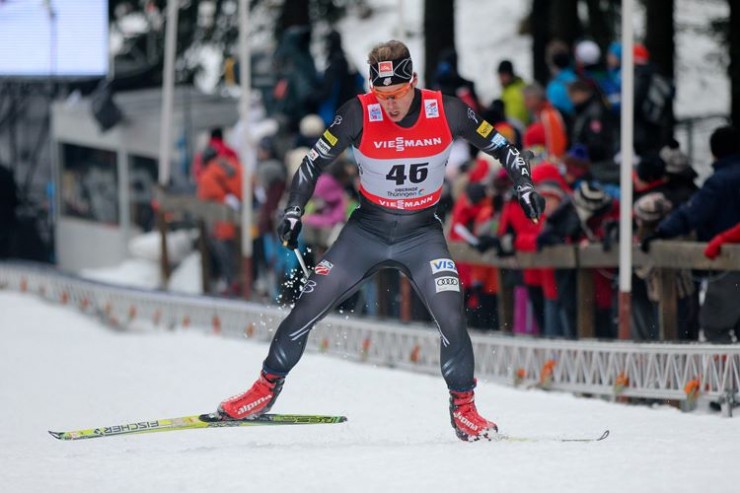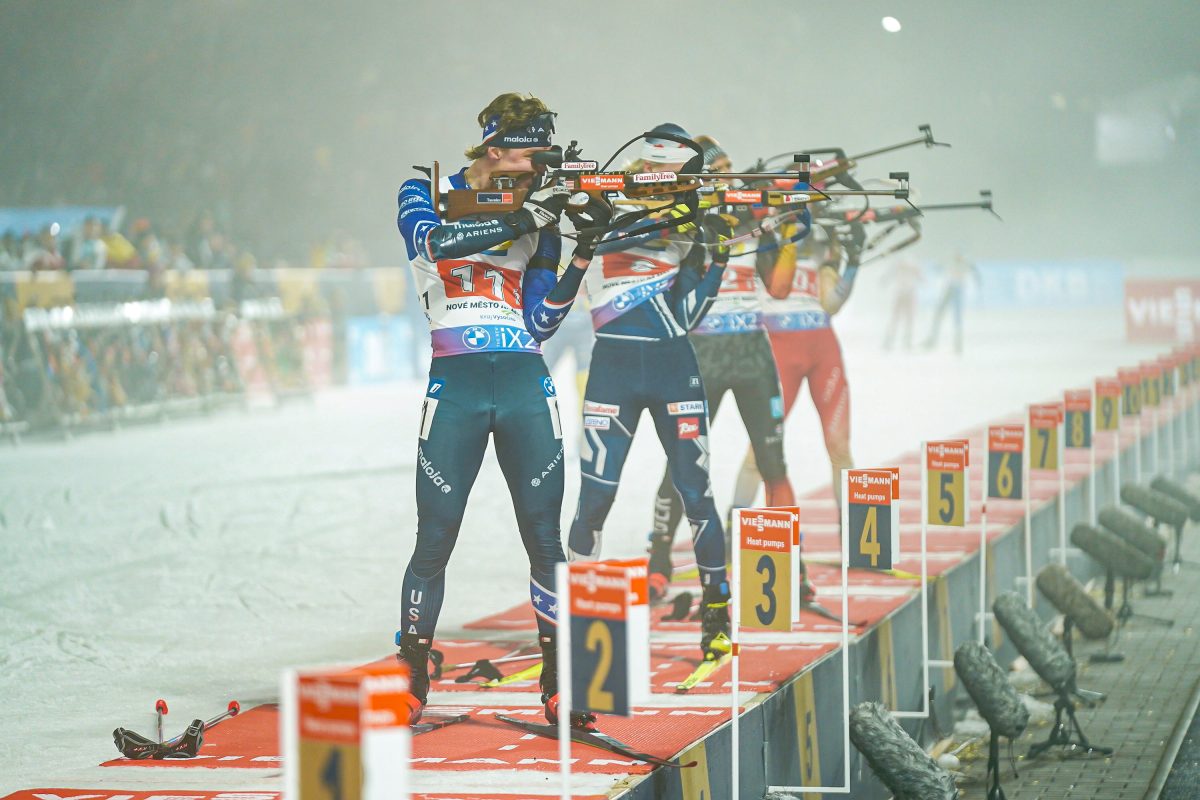
With two stages left in this year’s Tour de Ski, Kris Freeman would have just assumed to pack it up and head home.
The 32-year-old US Ski Team member didn’t have the greatest start or luck in the seven-stage event. On Day 2, he crashed one kilometer into the 15 k classic pursuit in Oberhof, Germany, badly bruising his shoulder and finishing 23 places back in 58th.
From there, it was an uphill battle in the multi-stage series he intended to excel in. Following the 35 k freestyle pursuit in Italy, Freeman – a type 1 diabetic – suffered one of the biggest glucose spikes in his life.
“My blood sugar did something it had never done before after a marathon style race,” the distance specialist wrote on his blog. “It rose and it kept rising. In fact it went higher than I have ever monitored it.
“As a panic reaction I dosed a very large amount of insulin to counteract the high,” Freeman continued. “I dosed too much and my glucose dropped to 30 (a non-diabetic would never see a number below 70). This low left me shaking and sweating so I ate carbs to bring my glucose back up, and it shot into the high range again.”

The next day, Freeman had a 5 k classic race to tackle in Toblach, Italy.
“I felt like a truck had hit me,” he wrote. “I called my doctor afterwards and he explained that the high blood sugars would have prevented any recovery from the previous day’s race by drastically raising my muscle enzymes. The low sugar caused my stress hormones, adrenaline and cortisol, to spike.
“The combination of the high and low sugar in rapid succession was in his words, ‘the equivalent of being shot in the chest,’ ” he added. “I was told that if he had been there with me he would have prevented me from racing in the 5k. Recovery would take about two weeks.”
That night, Freeman researched the cost of a flight home, but couldn’t find anything affordable for a week. With no option but to sit tight, he called his doctor to see if he could keep racing.
“He thought that there would be no danger of setbacks as long as I was able to keep my glucose in a normal range. He cautioned that I would most likely race poorly though,” Freeman wrote. “Because I was stuck in Europe anyway, the fact that I hate dropping out of anything, and that the last two races of the tour were good for me historically, led me to decide to keep racing.”
But his doctor was right. “I had nothing,” Freeman wrote.
He finished the Tour 44th overall and caught a flight home to New Hampshire. Freeman knew he needed time off, time to recover, but wasn’t a fan of returning home in the middle of the season. The Maine Winter Sport Center athlete spent nearly a month getting back to normal and rebuilding at home near Waterville Valley, a move he said was both necessary and effective.
FasterSkier caught up with Freeman a couple weeks ago before he returned to Europe for the Davos World Cup in Switzerland this weekend.
FasterSkier: Looking back on the Tour, what are your thoughts moving forward?
Kris Freeman: I’ve had high and low episodes on the Tour before just not as extreme. What makes it difficult, especially as you get toward the end of the Tour, is just the buildup of stress hormones, the buildup of cortisol over time makes things less predictable. Cortisol deadens the response to insulin in your body, so for a normal person, say Kikkan, Kikkan’s body would just up the insulin automatically as her cortisol levels rose whereas I have no way of measuring what my cortisol levels are and therefore it becomes more and more of a stab in the dark, while trying to adapt to altitude and different locations.
FS: How did you feel with all that going on?
KF: Usually I just felt like there wasn’t anything behind the racing. I could try to go hard but there was no strength; there was no power. Walking around I felt kind of tired, but you really don’t feel terrible until you try to go max out, and then that’s when you know something is unbalanced in the body. Just walking around town, I would say I felt kind of sluggish but I wouldn’t say, ‘Oh my body’s in a hormonal tornado at the moment.’ That’s the struggle of it. Insulin is a hormone and when your body doesn’t create one hormone, all the other hormones can get out of balance as well relatively easily.
FS: How long did it take to get back to normal?
KF: I took about a week. I took eight days of just doing single sessions or off of whatever I wanted to do, and after eight days I felt ready to train again. I went out, did a double session and my body responded well and I’ve been training pretty hard since.
I feel like I’m right back on track. There won’t be any way to really know until I go back to the World Cup and try it again, but the response has been pretty normal and it’s been what I was hoping for. The reason I went home is because I come home and everything is normal, I know what my body’s supposed to feel like, I know what response to good training feels like, there’s less guess work than jumping from hotel to hotel in Europe.
FS: Why did you want to hold off on returning until the Davos World Cup the weekend before World Championships?
KF: Looking at the schedule, [I would’ve stayed] another month in Europe to race twice, once in France and once in Sochi. The Tour was a big disappointment and I do not want the World Championships to be a disappointment so I decided that I was going to be as prepared for that as I could be.
FS: What are your goals for worlds?
KF: As my goal has been for a number of years now is finally stand on the podium, but if I get a top 10 at World Championships, I’ll walk away pretty happy with it.
FS: How do you feel about your season so far?
KF: It hasn’t been as good as I’d hoped. I felt like the only time I really was close to where I should be was in Canmore. (Note: Freeman was 10th and 14th in two distance races at the Alberta World Cup.)
Half the season, it feels like, was the Tour, but really it’s only a week so to say that the season has been a disappointment would be a little bit too extreme. I did have some good races in Canmore and really the season’s only half over.
FS: You’ve had some good races in Jackson, N.H., and Craftsbury, Vt. As the winner of both marathons, he did you feel racing?
KF: [At the 30 k classic in Jackson], I wasn’t expecting to have a real race on my hands but I think it’s important to put a bib on fairly regularly when you’re in the season just to stay in touch with racing, closed course, you don’t stop, that type of thing, you know?
(Note: Freeman won by nearly eight minutes, and a few weekends later, won the 50 k Craftsbury Marathon by more than 6 ½ minutes.)
I felt really good in the Craftsbury Marathon. I was strong and controlled for the whole race. It was nice to feel like myself again.
Alex Kochon
Alex Kochon (alexkochon@gmail.com) is a former FasterSkier editor and roving reporter who never really lost touch with the nordic scene. A freelance writer, editor, and outdoor-loving mom of two, she lives in northeastern New York and enjoys adventuring in the Adirondacks. She shares her passion for sports and recreation as the co-founder of "Ride On! Mountain Bike Trail Guide" and a sales and content contributor at Curated.com. When she's not skiing or chasing her kids around, Alex assists authors as a production and marketing coordinator for iPub Global Connection.



